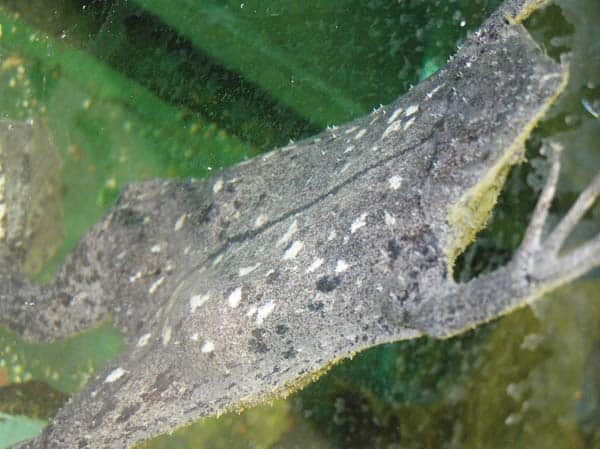Description:
30-gallon fish tank will easily house a pair. Fill the tank three-fourths of the way full with spring water or reverse-osmosis water, thus establishing a neutral PH. Using a fish tank water heater, set the water temperature at 70 to 75 degrees Fahrenheit. Depending on your room temperature, you might not even need the heater. Add a good, fully submersible water filter. Water quality is important; make sure the tank stays clean and free of filth. As far as decorations go, these frogs enjoy just about everything. Live plants are nice, but they are a little harder to keep up with. I use plastic, vine-type plants that are readily available at pet stores. The frogs like to hang out in them, and it makes a great place for them to set up their ambush of prey items. You can add substrate to the bottom for the look you might desire, but I’ve found no advantage to having lots of stuff in the tank. The frogs don’t need it, and it just makes cleaning more of a chore. If using unfiltered water, treat the water as you would for a fish tank for chemicals and such. They will eat just about anything they can catch and swallow, which also includes smaller individuals of their own species. They readily accept gold fish, comets, guppies, earthworms and smaller frogs. A staple diet of goldfish seems best. Male Surinam toads attract females with a loud underwater clicking noise that can be heard at great distances. In an acrobatic amplexus, the fertilized eggs become implanted in the female’s back, where they will stay until fully formed frogs emerge. Most Surinam toads are imported into the United States as juveniles, young adults and huge adults. Importation is sporadic and seasonal, so there’s either a whole bunch for sale across the country or none. Or so it seems. I have heard of albinos, but I have never seen one. These toads are being captive bred with more frequency, and the market is starting to reflect this trend. I now have a female carrying eggs in her back, the result of a captive breeding in my store. When the larvae hatch, they are fully formed frogs. Surinam toads can be found in reptile stores, on line and rarely at reptile shows. An easily maintained, easy-to-care-for pet. Treat it like a fish, only with not so much work as a fish. They are easy to feed, but they do have the habit of doing … nothing. They are capable of remaining stationary for what seems like days, unless you are present when they come to the surface for a quick breath. Otherwise they just sit and sit until food crossed their path. Then they lunge, swallow and go back to the job of sitting. Kind of like watching grass grow. But with their unique appearance and interesting reproduction, these are a treat worth owning. Ken Foose produced his first captive-bred snakes at age 11. With a Master’s Degree in zoology, he has been both a zookeeper and curator. He opened Exotic Pets, which specializes in reptiles and amphibians, in Las Vegas in 1991. He is currently president of the International Herpetological Symposium.
Habitat:
Totally aquatic. Lives in swamps, freshwater marches and streams in lowland tropical and subtropical forests
Range:
Venezuela, Trinidad and Tobago, Bolivia, Brazil, Colombia, Ecuador, Guyana, Peru and Surinam
Scientific Name: Pipa pipa
Species Group: toad
Family: Pipidae
Size: Adults reach 8 inches
Level: advanced
Weight: N/A
Dangerous: No



